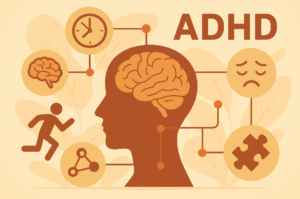Treating ADHD Without Medicines: Effective Non-Pharmacological Strategies
 Attention-Deficit/Hyperactivity Disorder (ADHD) is commonly treated with stimulant and non-stimulant medications. While these remain the gold standard for many, medication is not the only path to managing ADHD. A growing body of research and clinical experience highlights non-pharmacological strategies that can reduce symptoms, improve functioning, and enhance quality of life.
Attention-Deficit/Hyperactivity Disorder (ADHD) is commonly treated with stimulant and non-stimulant medications. While these remain the gold standard for many, medication is not the only path to managing ADHD. A growing body of research and clinical experience highlights non-pharmacological strategies that can reduce symptoms, improve functioning, and enhance quality of life.
This article explores evidence-based, drug-free approaches to treating ADHD in children, adolescents, and adults.
Why Consider Non-Medication Approaches for ADHD?
-
Some individuals experience side effects with stimulants or prefer to avoid long-term medication use.
-
Parents may want to explore holistic or complementary approaches for their children.
-
ADHD is a multifaceted disorder, involving self-regulation, motor control, sleep, and emotional regulation — areas that behavioral and lifestyle interventions can effectively target.
1. Behavioral Therapy and Cognitive-Behavioral Therapy (CBT)
-
Behavioral therapy helps children develop routines, manage disruptive behavior, and improve organizational skills. Parents are often trained alongside children to reinforce positive changes at home.
-
CBT is highly effective in older children and adults. It addresses negative thought patterns, teaches time management, and strengthens coping skills.
👉 Keyword tip: “behavioral therapy for ADHD without medication” is a commonly searched phrase.
2. Parent Training and Family Interventions
Parent management training equips caregivers with tools to:
-
Use positive reinforcement consistently.
-
Set clear expectations and limits.
-
Reduce household conflict and stress, which often worsen ADHD symptoms.
Family-based approaches create a supportive environment, ensuring that strategies at home align with those in school or therapy sessions.
3. School-Based Interventions
For children and adolescents, school is the main setting where ADHD-related challenges appear. Drug-free strategies include:
-
Individualized Education Plans (IEPs) or 504 Plans.
-
Classroom accommodations like shorter assignments, movement breaks, or preferential seating.
-
Collaboration between teachers, parents, and therapists to create consistency.
4. Neurofeedback and Brain Training
-
Neurofeedback teaches individuals to regulate brainwave activity through real-time feedback.
-
Studies show potential benefits in reducing inattention and impulsivity, though results can vary.
-
Often combined with CBT or coaching, neurofeedback is a promising complementary tool.
5. Lifestyle Interventions
Exercise and Physical Activity
-
Regular aerobic activity improves executive functioning, reduces hyperactivity, and enhances mood.
-
Activities requiring coordination and focus (martial arts, dance, yoga) may be especially effective.
Nutrition and Diet
-
Balanced meals with adequate protein and complex carbohydrates can stabilize energy and concentration.
-
Omega-3 fatty acid supplementation shows modest benefits for ADHD symptoms.
-
Eliminating food dyes and reducing processed sugars may help in sensitive individuals.
Sleep Optimization
-
Poor sleep worsens inattention and hyperactivity.
-
Establishing consistent sleep routines, reducing screen time before bed, and treating sleep disorders (e.g., sleep apnea) are crucial.
6. Coaching and Skills Training
-
ADHD coaching helps adolescents and adults set realistic goals, improve organization, and manage time effectively.
-
Skills training focuses on breaking large tasks into manageable steps, using reminders, and building habits.
7. Mindfulness and Meditation
Mindfulness-based practices help individuals:
-
Improve sustained attention.
-
Reduce stress and emotional reactivity.
-
Increase awareness of impulsive urges before acting.
Even brief, daily sessions of guided meditation can enhance self-regulation in both children and adults.
8. Digital and Technology-Based Therapies
-
Game-based digital therapeutics (e.g., EndeavorRx) are FDA-approved for pediatric ADHD.
-
Other apps and programs focus on cognitive training, executive functioning, and attention exercises.
These approaches provide structured, engaging ways to practice skills outside of therapy sessions.
Combining Approaches for Best Results
No single non-medication strategy works for everyone. The most effective approach often combines:
-
Behavioral therapy + parent training for children.
-
CBT + coaching + lifestyle changes for adults.
-
School support + family involvement across all ages.
Multimodal care is the key — tailored interventions can reduce reliance on medication or complement it when needed.
Key Takeaways
-
ADHD can be effectively managed without medicines using a combination of behavioral therapies, lifestyle changes, neurofeedback, and school or workplace interventions.
-
These strategies not only target attention and hyperactivity but also address emotional regulation, sleep, and overall well-being.
-
For many individuals, drug-free approaches work best when personalized and combined with structured support from family, teachers, and professionals.
✦ About the Author
I’m Dr. Srinivas Rajkumar T, MD (AIIMS, New Delhi), Consultant Psychiatrist based in Chennai with a special focus on ADHD care and research. My work bridges clinical practice, teaching, and writing, with a passion for making ADHD management — both with and without medicines — understandable and practical.
📍 Mind and Memory Clinic, Apollo Clinic, Velachery, Chennai (Opp. Phoenix Mall)
📞 +91 85951 55808
🌐 srinivasaiims.com